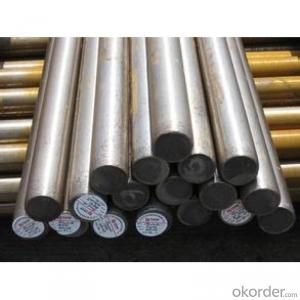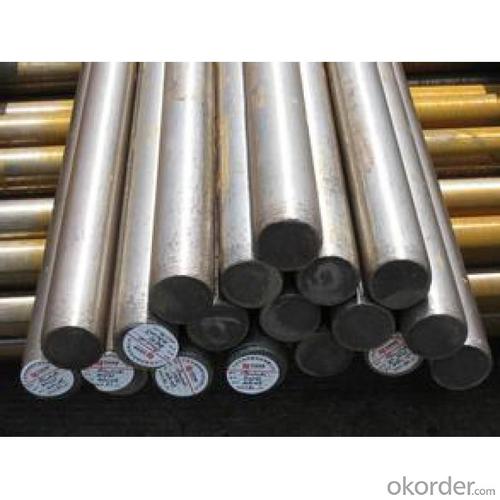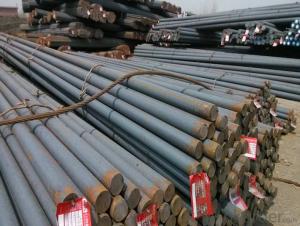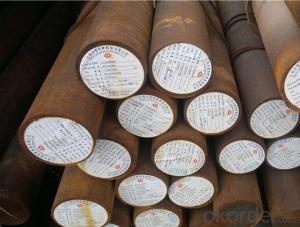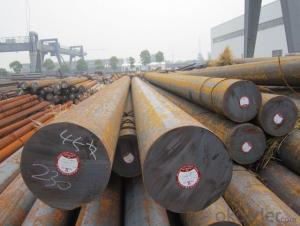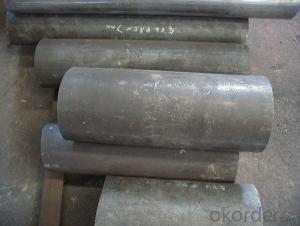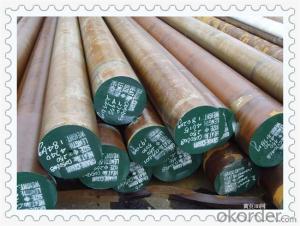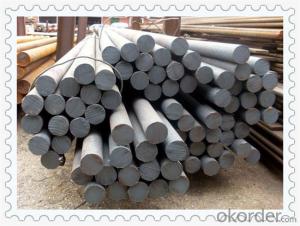Special Steel 1020 Carbon Steel Steel Round Bar
- Loading Port:
- China main port
- Payment Terms:
- TT or LC
- Min Order Qty:
- 25 m.t.
- Supply Capability:
- 10000 m.t./month
OKorder Service Pledge
OKorder Financial Service
You Might Also Like
Specification
The details of our Steel
1. Produce Standard: as the GB, AISI, ASTM, SAE, EN, BS, DIN, JIS Industry Standard
2. Produce processes: Smelt Iron -EAF smelt Billet - ESR smelt Billet -Hot rolled or forged get the steel round bar and plate
3. Heat treatment:
Normalized / Annealed / Quenched+Tempered
4. Quality assurance:
All order we can received Third party inspection, You can let SGS, BV,.. and others test company test and inspect our products before Goods shipping.
Product information
1.Specification of carbon steel 1020 | |||||||||||||
Round bar | Diameter(mm) | Length (mm) | |||||||||||
100~300 | 2000~5800 | ||||||||||||
Plate | Thickness(mm) | Width (mm) | Length (mm) | ||||||||||
20~70 | 105~610 | 2000~5800 | |||||||||||
The specification can be customised! | |||||||||||||
2.Chemical compositon of carbon steel 1020 | |||||||||||||
NO. | C | Mn | Si | Cr | W | V | P | S | |||||
carbon steel 1020 | 0.43~0.50 | 0.60~0.90 | 0.15~0.35 | -- | -- | -- | ≤0.030 | ≤0.030 | |||||
3.Delivery condition of carbon steel 1020 | |||||||||||||
Standard Number | Forging | Annealing | Hardening and Tempering | ||||||||||
carbon steel 1020 | 1100~850 | Subcritical annealing: 650~700 Isothermal annealing: 820~860 | Hardening :820~860 Tempering: 550~660 | ||||||||||
4.Heat treatment of carbon steel 1020 | |||||||||||||
1.Quench:1000-1040`C via 600`C and 850`C, preheating oil or wind cooling 2.Temper temperature should be higher than working temperature in order to stabilize the working size of mold 3.Heat up to 650°C of average temperature in order to eliminate the machined stress, 500 °c air cooling after electric cooker cooling 4.Tempering, 800-850 °c ,slow cooling after diathermia 5. Melting Process of SKD61 steel rod | |||||||||||||
1.EAF: Electric Furnace+LF+VD(Optional) | |||||||||||||
5.Characteristic of carbon steel 1020 | |||||||||||||
Nice machanical porpertys and worse hardenability,so, it is used for machine parts | |||||||||||||
6.Application of carbon steel 1020 | |||||||||||||
(1)Can be made into mould template, mortise pin, column | |||||||||||||
(2)This kind of steel have good mechanical property, is widely used in structural parts which may support stress alternation, especially made into some connecting rods, bolts, wheel gear. | |||||||||||||
(3)This kind of steel is the most common blanks and materials of shaft parts. | |||||||||||||
Main product
High speed steel | |
AISI | M2,M4,M35,M42,T1 |
DIN | 1.3343,1.3243,1.3247,1.3355 |
JIS | SKH51,SKH54,SKH35,SKH59,SKH2 |
Cold work tool steel | |
AISI | D2,D5,D3,D6,A8,A2,O1 |
DIN | 1.2379,1.2601,1.2080,1.2436,1.2631,1.2363,1.2510,1.2327 |
JIS | SKD10,SKD11,SKD1,SKS3 |
Hot work tool steel | |
AISI | H13,H11,H21 |
DIN | 1.2344,1.2343,1.2367,1.2581,1.2713 |
JIS | SKD61,SKD6,SKD7,SKD5SKT4 |
Plastic mould steel | |
AISI | P20,P20+Ni,420 |
DIN | 1.2311,1.2738,1.2083,1.2316 |
JIS | PDS-3,SUS420J1,SUS420J2 |
Alloy structural seel | |
AISI | 5140,4340,4135,4140 |
DIN | 1.7035,1.6511,1.7220,1.7225 |
JIS | SCr440,SNCM439,SCM435,SCM440 |
Stainless steel | |
AISI | 440C,420,430 |
DIN | 1.4125 |
JIS | SUS440C |
Carbon steel | |
AISI | 1045,1020 |
DIN | 1.1191 |
JIS | S45C, G3101 |
Product show

Workshop show

Shipping
1. FedEx/DHL/UPS/TNT for samples, Door-to-Door;
2. By Air or by Sea for batch goods, for FCL; Airport/ Port receiving;
3. Customers specifying freight forwarders or negotiable shipping methods!
Delivery Time: 3-7 days for samples; 5-25 days for batch goods.
Payment Terms
1.Payment: T/T, L/C, Western Union, MoneyGram,PayPal; 30% deposits; 70% balance before delivery.
2.MOQ: 1pcs
3.Warranty : 3 years
4.Package Informations: 1) EXPORT, In 20 feet (GW 25 ton) or 40 feet Container (GW 25 ton)
2)as customer's requirement
Why choose us?
(1) The leading exporter in China special steel industry.
(2) Large stocks for various sizes, fast delivery date.
(3) Good business relationship with China famous factories.
(4) More than 7 years steel exporting experience.
(5) Good after-sales service guarantee.
- Q: How is special steel produced?
- Special steel is produced through a meticulous process known as alloying, where different metals are combined with iron to enhance its properties. The alloying elements are carefully selected and added to molten iron, followed by precise temperature control and cooling to form the desired steel composition. This process ensures that special steel possesses superior strength, hardness, corrosion resistance, and other unique characteristics required for specialized applications.
- Q: How does special steel contribute to the transportation sector?
- The transportation sector relies heavily on special steel due to the numerous benefits it offers. Special steel plays a pivotal role in improving the efficiency, safety, and overall performance of vehicles. One primary advantage is its high strength-to-weight ratio, which allows manufacturers to reduce vehicle weight without compromising structural integrity. As a result, fuel efficiency improves, emissions decrease, and operating costs are lowered. Furthermore, special steel exhibits exceptional resistance to corrosion, making it especially advantageous in areas with severe weather conditions or exposure to saltwater, such as coastal regions or winter roadways where salt is used for ice melting. This corrosion resistance helps extend the lifespan of transportation infrastructure, such as bridges, tunnels, and railways, thus minimizing maintenance and replacement expenses. Another important aspect is the outstanding impact resistance of special steel. It can withstand heavy impacts and collisions, making it ideal for constructing vehicle frames, body panels, and safety components. This enhances passenger safety and reduces the likelihood of severe injuries during accidents. Special steel also plays a crucial role in producing high-performance engines and powertrains. Steel alloys with specific characteristics, such as high temperature and wear resistance, are utilized in manufacturing critical engine components like pistons, crankshafts, and camshafts. This ensures long-lasting and efficient engine performance, resulting in improved reliability and reduced downtime. Moreover, special steel contributes to advancements in electric and hybrid vehicles. Certain steel alloys possess unique properties that enable the development of lightweight battery packs, electric motor components, and charging infrastructure. These advancements facilitate the shift towards greener transportation options and help decrease the environmental impact of the sector. Overall, special steel has a profound influence on the transportation sector by providing lightweight, durable, corrosion-resistant, and impact-resistant materials. It not only enhances the performance and safety of vehicles but also contributes to the establishment of sustainable and efficient transportation systems.
- Q: What are the different methods for improving the electrical conductivity of special steel?
- There are several methods for improving the electrical conductivity of special steel, including alloying, heat treatment, and surface modifications. Alloying involves adding elements like copper, nickel, or silver to the steel to enhance its conductivity. Heat treatment processes such as annealing or quenching can also improve conductivity by altering the microstructure of the steel. Additionally, surface modifications like electroplating or coating can be employed to enhance electrical conductivity.
- Q: Carbon steel and stainless steel and pattern steel and special steel and high carbon steel difference
- Steel containing less than 0.25% of carbon is low carbon steel, 0. 25%-0.6% is medium carbon steel, more than 0.6% is high carbon steel, low, medium and high carbon steel can be called carbon steel, useful alloy composition is greater than 3, alloy steel
- Q: How does special steel contribute to reducing product failure?
- Special steel contributes to reducing product failure by providing enhanced strength, durability, and resistance to various external factors such as corrosion, wear, and extreme temperatures. Its unique properties make it suitable for critical components and applications where failure could have severe consequences. By using special steel in the manufacturing process, products are less likely to fail prematurely, ensuring reliability, safety, and ultimately reducing the risk of accidents or malfunctions.
- Q: How is martensitic steel used in knife making?
- Martensitic steel is commonly used in knife making due to its excellent hardness, strength, and ability to hold a sharp edge. This type of steel undergoes a heat treatment process called quenching, which transforms its structure to be very hard and brittle. Knives made from martensitic steel are highly durable and resistant to wear and corrosion, making them ideal for various cutting tasks.
- Q: Can special steel be used in food processing applications?
- Yes, special steel can be used in food processing applications. Special steel, such as stainless steel, is commonly used in the food industry due to its excellent corrosion resistance, hygienic properties, and durability. It is safe for food contact, easy to clean, and does not react with acidic or alkaline substances.
- Q: What are the different surface coatings available for special steel?
- There are several different surface coatings available for special steel, such as galvanizing, electroplating, powder coating, and organic coatings. Each coating offers unique benefits and characteristics, ranging from enhanced corrosion resistance to improved aesthetic appearance and durability. The choice of coating depends on the specific requirements of the application and the desired outcome for the steel product.
- Q: What are the applications of high-speed steel?
- High-speed steel is widely used in various applications due to its exceptional hardness, toughness, and heat resistance. It is extensively utilized in the manufacturing industry for cutting tools, such as drills, milling cutters, taps, and reamers. High-speed steel's ability to maintain its hardness at high temperatures makes it ideal for these cutting tools, enabling them to withstand the heat generated during machining processes. Additionally, high-speed steel is also employed in the production of saw blades, knives, and punches, where its durability and sharpness are crucial for efficient cutting and shaping operations.
- Q: How does special steel contribute to the robotics industry?
- The robotics industry benefits greatly from the use of special steel, which plays a vital role in its advancement. To begin with, special steel alloys possess extraordinary mechanical properties that make them ideal for manufacturing various robotic components. These alloys provide exceptional strength, durability, and resistance to wear and tear. Consequently, robots built with special steel can operate efficiently and reliably even in demanding environments like manufacturing plants or hazardous locations. Furthermore, special steel alloys offer outstanding heat resistance and thermal stability, a crucial characteristic in robotics. As robots often generate significant heat during operations, special steel components can withstand high temperatures without deforming or losing their structural integrity. This capability ensures that robots can perform optimally without the risk of mechanical failures caused by heat-related issues. Additionally, the corrosion resistance of special steel is highly advantageous for the robotics industry. Robots are increasingly being used in diverse applications such as underwater exploration, chemical handling, and outdoor environments. In such cases, exposure to moisture, chemicals, or harsh weather conditions can lead to corrosion and degradation of robot parts. By utilizing special steel alloys, manufacturers can significantly prolong the lifespan of robotic systems, reducing maintenance costs and enhancing overall reliability. Moreover, special steel's magnetic properties are invaluable in the development of magnetic sensors and actuators used in robotics. These sensors enable robots to detect and interact with their surroundings, improving their autonomy and adaptability. On the other hand, magnetic actuators enable precise control and movement in robotic systems. Special steel's magnetic properties contribute to the efficiency, accuracy, and responsiveness of these components, allowing robots to execute complex tasks with precision. In conclusion, special steel plays a vital role in the robotics industry by providing the necessary materials for manufacturing robust, high-performance, and versatile robotic systems. The use of special steel alloys enhances strength, durability, and the ability to withstand extreme conditions, ensuring the reliability, efficiency, and functionality of these machines.
Send your message to us
Special Steel 1020 Carbon Steel Steel Round Bar
- Loading Port:
- China main port
- Payment Terms:
- TT or LC
- Min Order Qty:
- 25 m.t.
- Supply Capability:
- 10000 m.t./month
OKorder Service Pledge
OKorder Financial Service
Similar products
Hot products
Hot Searches
Related keywords
